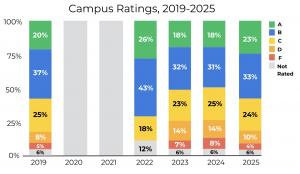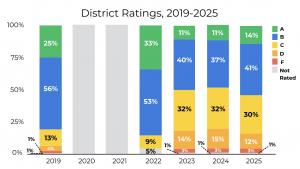In a Win for Transparency, TEA Releases School Accountability Scores for 2024 and 2025 School Years
Texas parents, community leaders and policymakers now have timely access to A-F ratings and school information for the first time in years.
AUSTIN, TX, UNITED STATES, August 15, 2025 /EINPresswire.com/ -- The Texas Education Agency today announced notable gains in A–F accountability ratings for public schools and districts statewide, with strong year-over-year improvements in both campus and district performance. These ratings, which have been intermittent in recent years due to ongoing litigation, offer valuable transparency to parents, community members and policymakers.
A main takeaway from the release of two years’ worth of campus and district ratings is the growth in “A” and “B” rated campuses and districts from 2024 to 2025.
● The number of “A” and “B” campuses grew by 7 percentage points, from 49% to 56%. Overall, nearly a third of campuses, or 31%, improved by at least one letter grade.
● The number of “A” and “B” districts also grew by 7 percentage points, from 48% to 55%. Close to a quarter of districts, or 24%, improved by at least one letter grade.
“This performance data is critical for Texas families. Without this information, moms and dads have no way of knowing how their child school is performing compared to other schools,” said Mary Lynn Pruneda, director for education and workforce policy at Texas 2036. “Parents have been kept in the dark for too long on their school's performance. They deserve timely, consistent information they can count on.”
The Texas A-F accountability system measures student achievement, school progress, and closing achievement gaps across the state’s 9,000 campuses. High schools and school systems also receive their score, in part, on how successfully they prepare their students for college, career or the military.
The latest scores include success stories in Houston ISD and Dallas ISD, where more students are attending well-rated campuses. Campuses seeing outsized growth offer school leaders and policymakers opportunities to learn from and adapt these successful strategies across the state.
Pruneda added, “We have a good story to tell when significant improvements are being registered in schools across Texas. It’s important to remember that we need reliable and transparent data to first identify and then overcome obstacles to success in Texas’ schools.”
Lawmakers in Austin are currently considering legislation to codify Texas’ accountability system and ensure schools have sufficient notice of any changes. The policy is linked with proposals to replace the STAAR test with a series of three, shorter tests to be administered throughout the school year.
Families would receive test results in a more timely manner, enabling parents to take action more quickly to help address areas where their children need help meeting academic benchmarks.
The legislation would also improve the A-F accountability system by ensuring the annual publication of accountability scores for schools and providing more points to schools that adequately prepare high school graduates for college, career or the military.
How we got here
After the disruptions caused by the COVID pandemic, school systems filed consecutive lawsuits to prevent the Texas Education Agency from releasing A-F accountability ratings for the 2023 and 2024 school years.
A coalition of Texas leaders representing parents, businesses and education nonprofits filed an amicus brief in Morath v. Pecos-Barstow-Toyah Independent School District (NO. 15-24-00101-CV) urging the 15th Court of Appeals to lift the injunction preventing the release of the 2024 ratings.
In the spring, the appeals court ruled that TEA could release ratings for the 2023 school year. The court subsequently allowed the release of 2024 ratings this summer.
Beneficiaries of a consistent and reliable rating system include:
Students: Academic ratings track how well school systems are meeting student academic needs and drive improvements in learning outcomes to eliminate achievement gaps for students and prepare them for success after graduation.
Parents: Clear, accessible information about their child’s school performance helps families make informed decisions and advocate for necessary educational resources.
School Districts & Community Partners: The A-F system enables school districts and their network of partners to identify underperforming campuses and allocate resources to support better outcomes.
Businesses: Employers rely on A-F ratings to attract and retain qualified workers in the communities where they operate and ensure a pipeline of qualified employees.
The Public: The system provides every Texan with a tool to monitor progress and ensure public funds are used effectively to improve public education.
The next challenge
The percentage of failing campuses halved from 2024 to 2025, from 8% to 4%. While we can cheer that data point, we must keep in mind what a single failing campus means — the closing of opportunities for many of the Texas children who attend and for their families. Simply put, tolerating even one single failing campus is not an option.
With the tools in place to measure the performance of every campus, we can now take steps to lift the remaining failing campuses and set the students there on the path to success.
###
About Texas 2036
Texas 2036 is a nonprofit, nonpartisan public policy organization dedicated to improving lives and opportunities for all Texans through 2036, Texas’ bicentennial year, and beyond.
Media Contact:
John Reynolds
Director of Communications
Ph: 512-468-7003
Email: media@texas2036.org
Merrill Davis
Texas 2036
+1 713-213-7297
email us here
Legal Disclaimer:
EIN Presswire provides this news content "as is" without warranty of any kind. We do not accept any responsibility or liability for the accuracy, content, images, videos, licenses, completeness, legality, or reliability of the information contained in this article. If you have any complaints or copyright issues related to this article, kindly contact the author above.



